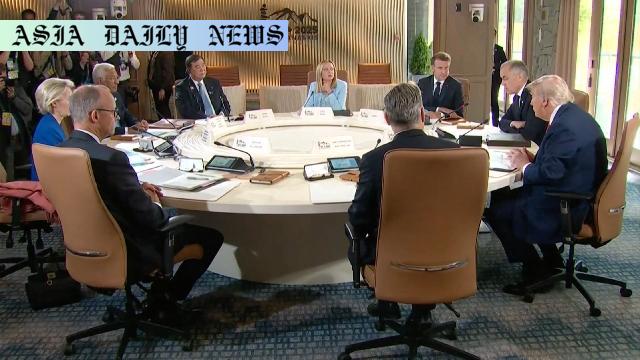Multilateral Trade: Japanese PM Ishiba emphasizes the importance of fortifying the multilateral WTO system for economic growth.

The Need to Strengthen Multilateral Trade Systems
Japanese Prime Minister Ishiba Shigeru, during the Group of Seven (G7) summit held in Canada, outlined the urgent necessity of maintaining and enhancing multilateral trade frameworks. His address highlighted the World Trade Organization (WTO) as a pivotal institution central to ensuring global economic growth. In a climate marked by increasing uncertainty, from regional conflicts to climate-induced natural disasters, the prime minister stressed the importance of collective, rules-based cooperation among nations.
G7 Leaders on Global Economic Uncertainty
The opening session of the G7 summit, centered around the global economy, saw Ishiba underscoring the dangers posed by rising economic tensions. These include trade disputes, protectionist policies, and an increasingly fragmented international community. Ishiba emphasized that the WTO has contributed significantly to the prosperity of G7 nations and reminded leaders of its foundational impact on global trade. His call for reinvigorating global cooperation sheds light on the importance of these mechanisms as cushions against unpredictable global shocks.
Promoting Investments for Mutual Economic Growth
A cornerstone of Ishiba’s address was the emphasis on the power of investment-driven collaboration among nations. He proposed that G7 members re-examine their commitment to premier economic agreements like the WTO and fortify their shared economic relationships through collaborative investments in technology, trade, and sustainable development. By fostering interdependence, nations could secure mutual benefits while championing the long-term viability of global trade.
Conclusion: Unity as a Catalyst for Progress
In conclusion, Ishiba’s address at the G7 summit serves as a clarion call for nations to adapt to contemporary global challenges by strengthening multilateral trade systems. These systems not only provide a structure for global economic interaction but also act as buffers against emerging geopolitical and environmental risks. To realize the vision of a sustained, prosperous global order, nations must embrace collaborative efforts driven by shared values and equitable rules.
Commentary
Reflections on Ishiba’s Vision for Multilateral Trade
Prime Minister Ishiba’s remarks at the G7 summit underline an issue that has long been at the core of global economic discourse: the significance of multilateral cooperation. In an era riddled with trade tensions and economic nationalism, his call to strengthen the multilateral trading system signals a powerful step toward rebuilding trust in international institutions that have sustained the global economy for decades. The emphasis on the WTO not only highlights its role as an economic guardian but also serves as a reminder of its potential to promote equitable growth.
The Role of G7 in Leading Global Trade Frameworks
The G7 nations are undoubtedly among the most influential players in shaping the global economic order. By championing open trade policies and supporting structures like the WTO, these countries can counter isolationist tendencies elsewhere in the world. Ishiba’s insistence on unity reflects a broader recognition of the interconnectedness of modern economies. Such a stance could empower nations to mobilize collective strength in addressing systemic issues ranging from supply chain disruptions to emerging financial crises.
Investments as a Pillar for Economic Stability
One of the most resonant components of Ishiba’s speech lies in the focus on investments to bolster mutual economic growth. By emphasizing cross-border investments and technological collaboration, G7 nations can create avenues for innovation and productivity. These efforts, if implemented effectively, will not only stabilize economies but also build resilience against future shocks. Ishiba’s vision of growing “stronger together” is a compelling argument for reimagining multilateral trade as a driver of progress in the 21st century.


